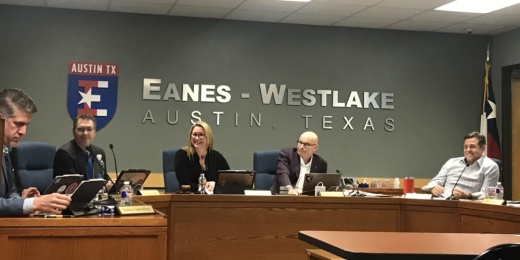Facing a $2.3 million budget deficit for the 2019-20 school year, Eanes ISD passed a resolution during a Feb. 25 board meeting for the option to seek a voter-approved tax rate election.
Administrators have often stated that House Bill 3, which passed in June, provided the EISD with significantly less financial assistance than its neighboring districts. For example, for every dollar EISD received, Lake Travis ISD received six, according to district information.
Following HB 3, EISD passed a 4.5% raise for all staff members partly in an attempt to keep up with the influx of competitive salary increases approved by nearby districts. District officials stated that the salary adjustments contributed to the overall debt.
However, the addition of golden pennies could keep the district in good financial standing, according to Chief Financial Officer Chris Scott.
Under HB 3, school districts are allowed a maximum of eight golden pennies, which are pennies within a district’s maintenance and operations tax bill that are not subject to recapture payments.
Texas’ recapture system was established in 1993 and requires districts with a cost per student higher than $6,030 to contribute payments based on their taxable value, according to the Texas Education Agency. The money is collected into an education fund and redistributed to school districts that fall below the $6,030 threshold.
EISD contributed 60% of its property taxes in 2018-19 to recapture and retained about $59.5 million, according to district information. Since golden pennies are not subject to these payments they are considered very valuable, according to EISD officials.
The district has six golden pennies—the amount permitted prior to eased restrictions from HB 3—and they represent $0.06 of EISD’s total tax rate of $1.13 per $100 valuation.
In order to obtain two additional pennies, the district is required to conduct an efficiency audit and hold a voter-approved tax rate election.
If approved, the tax rate shift will enable the district to increase its golden penny rate by two while lowering the interest and sinking rate by the same amount, allowing the district to retain more local dollars while resulting in no change for residents' overall rate.
Travis Central Appraisal District appraisals
Scott previously reported this could bring the district an additional $3.5 million. However, he noted during the Feb. 25 meeting that the presented data did not take into account the recent news regarding Travis County home appraisals.
The Travis Central Appraisal District informed local school districts Feb. 12 that it will not appraise residential properties in 2020. This was the result of the Austin Board of Realtors sending TCAD a cease-and-desist order in May, which prohibited the TCAD from utilizing market data in the appraisal process.
This decision led Chief Appraiser Marya Crigler to announce that TCAD will use last year’s values for 2020.
“We were expecting TCAD to be doing the job the same way that they’ve been doing the job forever,” Superintendent Tom Leonard said, adding that the district was anticipating a 7.2% increase in property values based off previous years.
TCAD is scheduled to hold a meeting Feb. 27, and Leonard stated he hopes to hear news regarding an alternative plan for appraisals.
The district will continue the discussion on budget implications throughout upcoming months.





